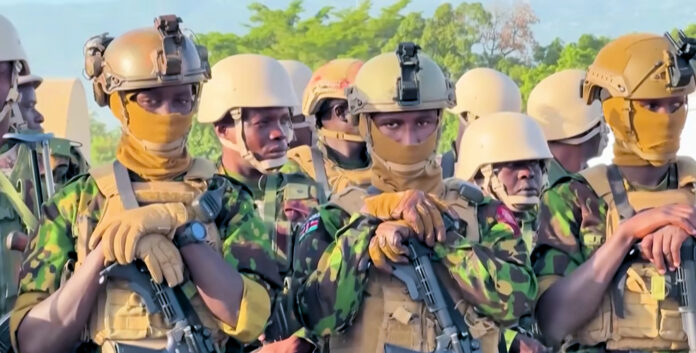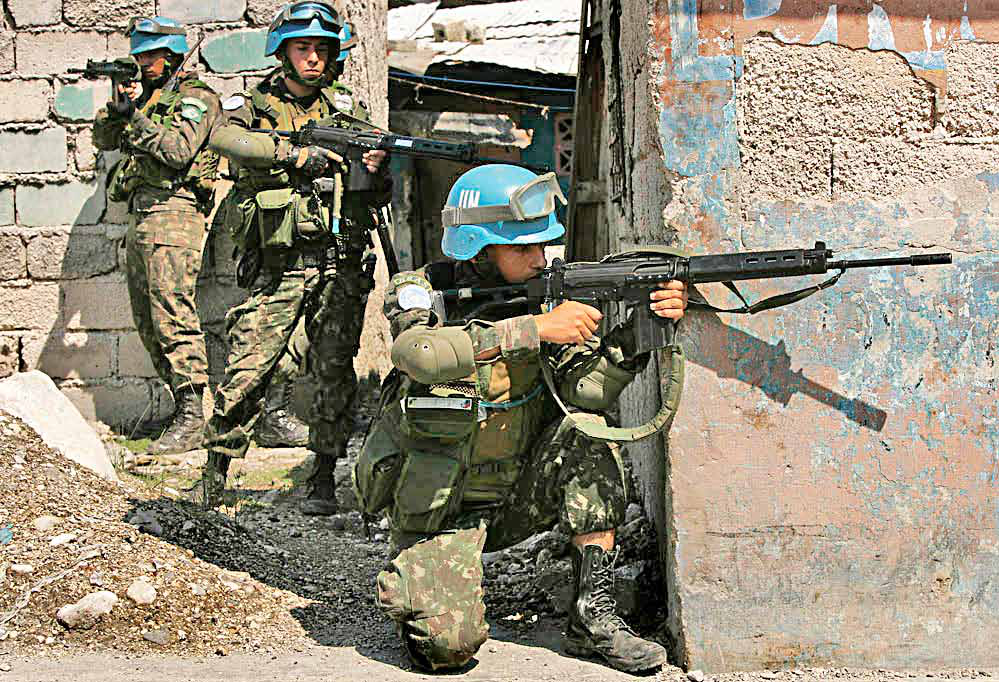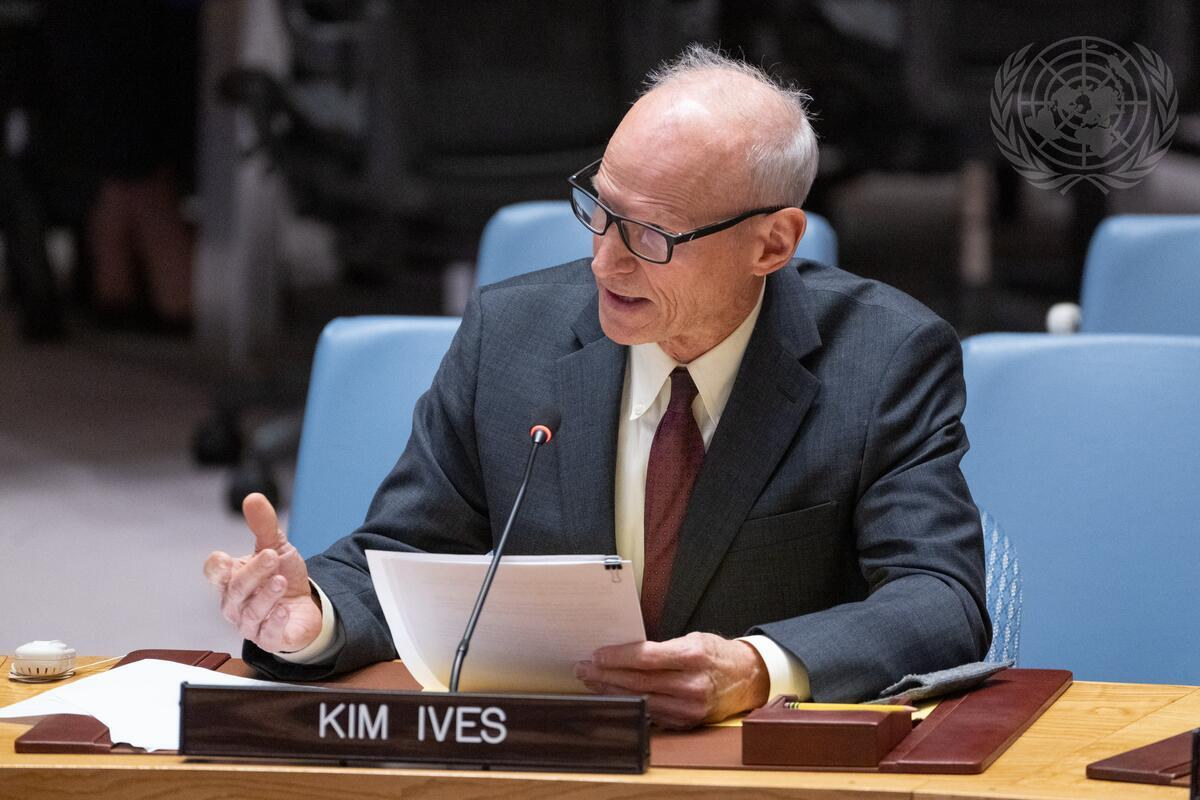
The Multinational Security Support (MSS) mission to Haiti is an utter, dismal, humiliating failure.
That is the only conclusion one can make on seeing Washington present a draft resolution to the United Nations Security Council (UNSC) – Haïti Liberté has procured a copy – for “the UN to begin planning to transition the MSS mission to a UN Peacekeeping Operation, in order to sustain the gains made by the MSS mission.” (Our emphasis.) The proposal comes only one day after U.S. Secretary of State Anthony Blinken visited Haiti on Sep. 5.
This proposal is shocking and likely doomed for several reasons.
1) The MSS has made absolutely no gains in Haiti. So far, there are only 380 Kenyan cops of the 2,500 troops from 10 nations that Washington had sought to assemble. Since their arrival in June and July, those police officers have spent most of their time in their U.S.-built base at the Port-au-Prince airport, reluctant to go out on missions to confront Port-au-Prince’s armed groups, gathered in a coalition called Viv Ansanm (Live Together).
The Haitian National Police (PNH) officers, who get paid seven times less than the Kenyans, are resentful and bitter about the risk-adverse Kenyans combined with the pay-scale chasm.
Furthermore, Washington is the MSS’s only real backer. It has given 63% ($369 million) of the force’s $589 million annual budget (in reality, the total cost is much more, some sources tell us). The UN has been able to collect another 11% ($68 million) in donations, but the MSS is still $152 million short. Faced with previous UNSC disapproval, Washington has historically managed to concoct various “Coalitions of the Willing” for operations like the invasions of the Dominican Republic (1965), Grenada (1983), and Iraq (2003). But in the new multipolar, declining-West world, the MSS appears to be a “Coalition of the Unwilling.”

2) The MSS mandate is about to expire on Oct. 2. On that date in 2023 the UNSC passed Resolution 2699 which authorized (not sponsored) the MSS “for an initial period of twelve months.” Washington was forced to resort to the MSS – what its UN representative called at the time called “a new way of preserving global peace and security” – because the UNSC was reluctant to send another Chapter 7 “peace-keeping” mission to Haiti. Russia and China abstained from voting on Resolution 2699.
With the authorization deadline only three weeks away, Washington may be proposing the upgrade to a genuine UN deployment as an opening gambit to bargain for another UNSC benediction, like the 2023 one, for the MSS.
3) The notion of sending a third UN military mission to Haiti in 30 years is unpopular with the UN Security Council, particularly with veto-wielders Russia and China.
““Russia cannot agree to invoking Chapter 7 almost blindly,” Russia’s UN Ambassador Vassily Nebenzia said after the Oct. 2, 2023 vote. “Haiti’s history has sufficient experience of irresponsible foreign interference, which is exactly what kicked off a spiral of degradation which Haiti’s people have been unable to overcome for years. For us to authorize another use of force in Haiti without being fully cognizant of the mission’s parameters is an imprudent thing to do.”
“Proceeding from the principles of respect for sovereignty and non-interference in internal affairs, China has always taken a cautious and responsible approach on the Council’s invocation of Chapter 7 on the authorization of the use of force,” said China’s Ambassador Zhang Jun in explaining his nation’s abstention on Oct. 2.
4) Any UN military occupation is unpopular with Haitians, given the horrendous history of the two previous deployments. By far the worst was the UN Mission to Stabilize Haiti (MINUSTAH), which was a “Brutal, Ineffectual, and Polluting UN Force,” according to the U.S. State Department’s own secret cables, provided by Wikileaks to Haïti Liberté in 2011. It operated in Haiti from 2004 to 2017.
Even some of the State Department’s own alumni agree that another UN deployment would be a big mistake.
Former U.S. Special Envoy to Haiti, Daniel Foote “also criticized the idea of relaunching a UN peacekeeping operation in Haiti, noting that Haitians strongly oppose any new UN mission because of past abuses and atrocities by peacekeepers, including massacres, sexual exploitation and the introduction of cholera,” reported RHI News on Sep. 6.

“Haitians are unanimous on one thing: they hate the UN and they don’t want another peacekeeping mission,” Foote told RHI.
5) The world is outraged and disgusted by U.S.-sponsored wars around the planet, particularly those in Ukraine and Gaza. Having a MINUSTAH 2.0 rekindled is alarming to much of the Global South.
6) A UN Peacekeeping Mission in Haiti would be a violation of the UN Charter. In its draft resolution, co-authored by Ecuador, the U.S. argues that “the situation in Haiti continues to constitute a threat to international peace and security and to stability in the region.” This is patently absurd. There is no conflict between nations, which is what a UN Peacekeeping Operation is deployed to stop as in Cyprus or on the India/Pakistan border. The conflict in Haiti today is a purely internal political matter.
On Dec. 21, 2022, Haïti Liberté addressed the UNSC, explaining that: “We at Haïti Liberté strongly believe that the situation in Haiti cannot be resolved through foreign intervention, military force, or even sanctions. The Haitian people, acting with full sovereignty, must be allowed to sort out their own problems, just as they did 219 years ago when they founded Latin America’s first nation… We call on this council to respect the principles enshrined in its Charter, in particular Article 2, Paragraph 7 which states that ‘Nothing contained in the present Charter shall authorize the United Nations to intervene in matters which are essentially within the domestic jurisdiction of any state.’”











[…] de l’ONU pour transformer sa mission mercenaire en Haïti en une mission à part entière Opération de « maintien de la paix » de l’ONU. Autrement dit, MINUSTAH […]
[…] appelée Mission multinationale de soutien à la sécurité (MSS), a récemment appuyé la proposition infructueuse de Washington de la transformer en une véritable intervention militaire de […]
[…] September, Washington already tried to upgrade the MSS into a UNPKO but could not get it through the […]
[…] septembre, Washington déjà essayé de mettre à jour le MSS dans une opération de maintien de la paix de l’ONU, mais n’a pas pu le faire passer […]
[…] des Forces armées d’Haïti (FAdH) et des forces armées financées par les États-Unis. Soutien à la sécurité multinationale mission (MSS), composée de 430 policiers pour la plupart […]
[…] has only raised a paltry $110 million to date. For the first year of its mandate, the U.S. provided 63% of the MSS’s official $589 million […]